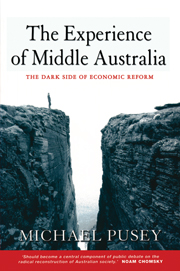Book contents
- Frontmatter
- Contents
- List of Illustrations
- Preface
- Abbreviations
- Chapter 1 The Experience of Economic Reform
- Chapter 2 Incomes and Their Meanings
- Chapter 3 Jobs, Work and Fairness in the Wake of Labour Market Reform
- Chapter 4 Working Families: Struggling with the Costs of Reform
- Chapter 5 Civil Society and Communities
- Chapter 6 Politics, Power and Institutions
- Chapter 7 Judgements on Economic Reform
- Appendix A Chronology of Economic Reform
- Appendix B Methods and Procedures: Middle Australia Project
- Appendix C Supplementary Tables
- Appendix D Income and Equivalent Household Income
- Notes
- Index
Chapter 4 - Working Families: Struggling with the Costs of Reform
Published online by Cambridge University Press: 22 September 2009
- Frontmatter
- Contents
- List of Illustrations
- Preface
- Abbreviations
- Chapter 1 The Experience of Economic Reform
- Chapter 2 Incomes and Their Meanings
- Chapter 3 Jobs, Work and Fairness in the Wake of Labour Market Reform
- Chapter 4 Working Families: Struggling with the Costs of Reform
- Chapter 5 Civil Society and Communities
- Chapter 6 Politics, Power and Institutions
- Chapter 7 Judgements on Economic Reform
- Appendix A Chronology of Economic Reform
- Appendix B Methods and Procedures: Middle Australia Project
- Appendix C Supplementary Tables
- Appendix D Income and Equivalent Household Income
- Notes
- Index
Summary
In the requirements of the market, the requirements of the family, marriage, parenthood, or partnership are ignored. Those who demand mobility in the labour market sense, without regard to private interests, are pursuing the dissolution of the family precisely in their capacity as apostles of the market.
Ulrich BeckFamilies are always adapting to changing economic conditions. The new element over the last two decades is that most of the benefits of vigorous economic restructuring have been passed to corporations as most of the costs have been loaded on families. In this sense, the family is the big loser from economic reform. The impacts on families become what the reformer economists too easily dismiss as the (necessary) externalities of economic restructuring. Once they have been successfully ‘externalised’ in the name of greater economic efficiency and responsiveness to market signals, they are of no further concern to the reformers. In this chapter we shall look at middle Australia's daily experience of dealing with the externalities of economic reform. We want to understand how that experience shows up in the life of middle Australian families. What kind of accommodations are they making to the new demands of a deregulated labour market? In what respects is it received as a source of freedom, of choice, of constraint? How do men and women deal with the pressures of living in families? How do they internalise the externalities that have been thrust upon them?
- Type
- Chapter
- Information
- The Experience of Middle AustraliaThe Dark Side of Economic Reform, pp. 76 - 110Publisher: Cambridge University PressPrint publication year: 2003



